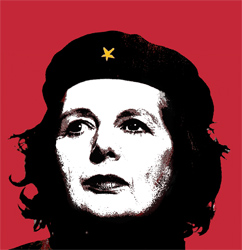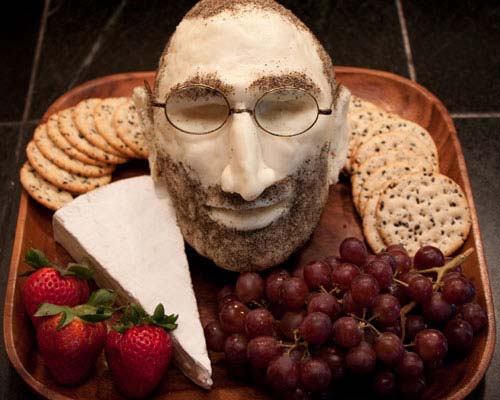Sorry to keep up with the obesity blogging, but I’ve been running across science-based articles today that shed some light, possibly, on the psychology, both social and individual, of obesity. New and occasional readers should know that I place my critical comments about obesity within a general theological/philosophical point of view (which sees the overcoming of disordered passions as a key goal in life), and a general critique of our culture as one in which we have embraced individual willfulness over and against any idea of limits and self-restraint. But in this post, I’d like to point to a couple of pieces I read that could shed light on the social structures that could lead to obesity.
For example, the behavioral psychologist Dan Ariely talks about cheating, and the social/professional environment that either facilitates or discourages an ethic of cheating. Excerpt:
People have two goals: We want to look in the mirror and feel good about ourselves, and we want to benefit from cheating. You would think you couldn’t get both, but our psychology is sufficiently flexible that we can as long as we cheat just a little bit. We have found this to be the case in experiment after experiment.
In my view, most people who behave badly are not bad people. They’re just good people who are put in bad situations–where it’s tempting and easy to cheat a little bit. Look at the whole financial crisis, if you and I were getting paid $8 million a year to view mortgage-backed securities as good products, we could do it. It’s inhumane to put people in situations that have tremendous conflict of interest and expect them to be unswayed by it. Ideally, professions eliminate these problems by not making people face them.
This sounds like the dynamic that always comes into play when I diet. I want to reach a certain goal, and I know that I can only do that by living by a strict code of what I can and cannot eat. Yet I am weak, and will cheat if given the chance — and given the food culture we live in here, it’s very, very easy to do. On my honeymoon in Portugal back in 1998, I was startled and irritated to discover that most restaurants keep strict hours — that you can’t just walk into places when you like and expect to be served. I realized that in the US, we’re accustomed to being able to eat what we like, when we like it. The impulse to make everything convenient for us has in many ways done away with traditions that govern the consumption of food.
Similarly, I was surprised when I first started visiting the Netherlands in the 1980s to discover people who, despite a superficial reputation for hedonism, were actually rather self-disciplined. They ate normal portions of reasonably healthy food, and while not puritanical about the use of alcohol, looked down on drunkenness. The idea of an “all you can eat” buffet seemed so out of place. I didn’t see much, if any, obesity there.
Eight years ago, I was interviewing a Dutch criminologist about Dutch cultural attitudes, and how they affect the use of drugs among Dutch people. He told me things were rapidly changing in the Netherlands, and that the Dutch were losing their cultural inhibitions, becoming instead more American-like in their attitudes toward indulgence. I suppose I shouldn’t be surprised, then, to learn from this Dutch government paper that on obesity statistics, the Dutch people are about 10 years behind Americans, but on the same track. What social factors are causing the Dutch to cast off their culturally-supported reticence? Holland is traditionally a far more conformist society than ours is (I say that not as a criticism, but as an observation), which is why customs and social disapproval were so powerful in engineering social behavior. That’s withering away.
Why? Seriously, how come? Obesity is expanding all over Europe, whose sensible eating traditions have long been compared favorably to American habits. What is changing in our societies to encourage obesity? Is there any connection to deeper social forces that have led to the economic crash (e.g., a belief that one should be able to consume as much as one wants to, and a disbelief that consequences matter)?
On another point, Sally Satel reviews a new book about addiction that counters the conventional medical wisdom that addiction is hard-wired into the brains of addicts, and cannot be overcome. The author says no, that free will is involved to a distinct degree. Excerpt from Satel’s review after the jump:
It may strike some as insensitive to insist that addiction is a disorder of choice. “I have never come across a single drug-addicted person who told me [he or she] wanted to be addicted,” Nora Volkow, the current director of NIDA says. Exactly so. How many of us have ever come across a person who wanted to be fat? So many undesirable outcomes in life are achieved incrementally. In a choice model, full-blown addiction is the triumph of feel-good local decisions (“I’ll use today”) over punishing global anxieties (“I don’t want to be an addict tomorrow”). Let’s follow a typical trajectory. At the start of an episode of addiction, the drug increases in hedonic value while once-rewarding activities such as relationships, job, or family recede in value. Although the appeal of using starts to fade as consequences pile up–spending too much money, disappointing loved ones, attracting suspicion at work–the drug still retains value because it salves psychic pain, suppresses withdrawal symptoms, and douses intense craving.
At some point, however, even these benefits come to be outweighed by adverse fallout. The balance shifts and the addict tips into recovery. The idea is to accelerate the process by, as Heyman says, “chang[ing] … conditions that markedly reduce the value of the drug relative to the nondrug alternative.” This can be achieved through treatment, imposing credible threats–recall the case of impaired pilots and physicians–or the development of new modes of gratification that compete with drugs.
The author of Addiction: A Disorder of Choice [Gene Heyman] is a behavioral psychologist, not a clinician. This may be why he does not pay much attention to the reasons people use drugs. Clinicians, like myself, tend to see addiction as a form of self-medication. Addicts are drawn to drugs to salve depression, anxiety, boredom, self-loathing. Heyman’s training as a behavioral psychologist may also explain why he writes of addiction to drugs as barely distinct from other kinds of excessive appetites (for food, sex, shopping) in the context of the choice model. Here he does not fully persuade.
I’d like to know more about why he fails to fully persuade, only because Satel’s recap of the author’s point about the addiction process sounds a lot like why some people become dependent on food. If the author is correct, it suggests that not all the obese are doomed to accept their fate, and that we can change social structures to encourage personal reform (as opposed to changing social structures to accept obesity as within the range of normative). Thoughts?

